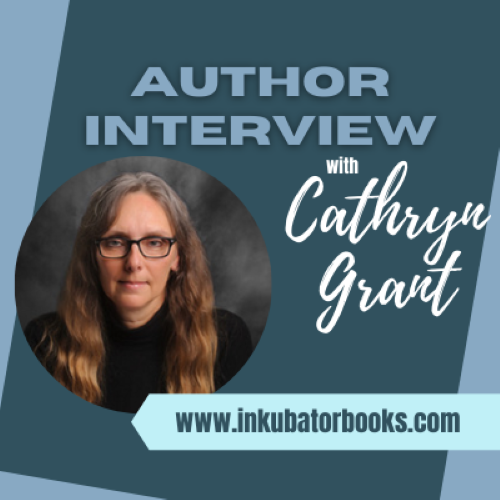Today, we’re speaking with Inkubator Books’ author Cathryn Grant. Cathryn is the author of Always Remember and The Good Neighbor.
Inkubator Books: When did you start writing?
Cathryn Grant: I wrote my first mystery when I was ten years old. Sadly, I abandoned my first love and didn’t start writing fiction seriously until I’d stumbled into a career of sorts in the high-tech industry. My co-workers and I were discussing returning to school to get our MBAs. I realized I could put several years and most of my evenings and weekends into a degree that might advance a career I wasn’t all that excited about, or I could devote those hours to discovering whether I had what it took to “make it” as a fiction writer.
IB: What does a typical day of writing look like for you?
CG: I go for a long walk on the beach at sunrise. After breakfast, I make light revisions to the previous day’s work to get my mind back into the world of my story and start writing. I do a bit of exercise and write for a few more hours after lunch. Another round of exercise and then I shift my attention to another novel until dinner time, since I’m always writing a book in my Alexandra Mallory series and a standalone psychological thriller at the same time.
Of course, all of these writing hours are interrupted with a bit too much web surfing, Scrabble, social media, and not enough chats with family and friends.
IB: Do you base your characters off people you know or are they all the product of your imagination?
CG: I use character traits I’ve observed in people I know, and in myself, but not people in their entirety, which is really impossible. Human beings are too complex.
IB: What’s the most difficult part of your writing process?
CG: Trying to keep track of, or locate, where things are in the story. Since I write a quite a lot of interior monologue, it’s difficult to recall where in the story a character had a particular thought and whether I thought about writing it or actually wrote it! I have to keep track of those things to maintain consistency and no matter how many little notes I make and spreadsheets I maintain, I lose track.
IB: What comes first for you – plot or characters?
CG: Characters.
IB: Which of your books is your favorite? Why?
CG: Always the book I’m currently writing because I love the magic of telling a new story. I love the thrill of watching characters come to life, of seeing the story unfold in front of me, of discovering how the pieces fit together.
IB: How would you describe your ideal reader?
CG: As I’ve exchanged messages with readers, I’ve come to see that each person is (obviously) utterly unique. For this reason, my ideal reader can’t be defined as a type of person. My ideal reader is one who connects with my stories. I think there’s some inexplicable magic that happens between a writer’s vision, her words on the page, and the reader’s psyche and imagination that can’t be defined.
IB: What are you doing when you aren’t writing?
CG: Reading. Playing golf (not very well). Walking on the beach. Thinking about my characters.
IB: What does your writing space look like?
CG: It’s a 4×12’ (1.5×3.5 meter) room with a small window. I have a low bookcase to store my favorite books on the craft of writing, a large box stuffed with scraps of paper containing ideas for characters and stories, a white board for plotting, a small table for tea and water, and all kinds of icons—shells and sea glass from the beach, pebbles, Egyptian figurines, and a black and white ink print of a martini glass to evoke the main character in my series. I also have my father’s slide rule, an Egyptian-themed quilt my mother made for me, a model canoe my husband gave me, one of my sister’s paintings… I should probably stop there! Facing all of these inspirational objects is a comfy armchair where I sit cross-legged with a laptop and write.
IB: Have you ever traveled to do research for a book?
CG: No, but when I travel, I often come up with novels or stories based on the setting around me, or weave pieces of my surroundings into upcoming novels.
IB: What genres do you like to read? Who are some of your favorite authors?
CG: I read mostly crime fiction, psychological suspense, psychological thrillers, and mainstream/literary fiction. For years my favorite authors have been Joyce Carol Oates (as well as her Rosamond Smith psychological suspense novels) and Ruth Rendell (and her Barbara Vine novels). There are many others, but Ms. Oates and Ms. Rendell are the most prolific and most beloved. More recently, Erin Kelly.
IB: How do you come up with names for your characters?
CG: Often, names will pop into my head out of nowhere. Sometimes I look for names with a meaning that fits with what I see as the essence of the character. I also spend a lot of time looking through baby name lists!
IB: What was your favorite childhood book?
CG: In grade school, I loved a series written by Margaret Sutton between 1932 and 1967—the Judy Bolton Mystery Series. The books had belonged to my mother and I devoured them. In my view, Judy Bolton was edgier and more sophisticated, more complex and interesting than Nancy Drew.
IB: Have you ever abandoned a book you were writing? How did you know it was the right thing to do?
CG: I wrote a novel about a character (this time, based on someone I knew). This woman had mentally pestered me for years to tell her (imagined) story. She was a troubled and somewhat cruel woman, but I knew enough about her to know her behavior grew out of cruelties inflicted upon her at a young age. I finally wrote the novel in a feverish pitch. My husband guessed the twist about four chapters into the novel so I put it aside. However, I haven’t abandoned it. Someday, I’ll return.
IB: Do you have any tips for first-time authors?
CG: The tips I have to offer are nothing that hasn’t already been said. Read voraciously. Write every day. After a while, get feedback. Read books on craft. Trust your voice.
IB: Who inspires you?
CG: Anyone and everyone who pursued a dream, didn’t quit, and realized that dream.
IB: If you could eliminate one thing from your daily life, what would it be?
CG: Loud, unpleasant noises.
IB: Do you have any pets?
CG: We have a cat as regal as her namesake—Cleopatra. She had a loving and charming sister, Isis, who recently crossed the rainbow bridge.
IB: How do you approach your genre in a unique way?
CG: I don’t know if this is unique, but I’m very interested in why people are driven to crime. For a long time, I’ve been obsessed with the idea that—there but for the grace of God go I. So I tend to start from a place of what circumstances might conspire to cause someone to commit a crime rather than the how or the who or the what. But I imagine that might be the case for quite a few writers in the psychological sub-genres.
IB: How do you manage the “whodunit” aspects of your story as far as clues and revelations? Do you outline?
CG: Inkubator Books uses a unique Writers Room process that’s widely used in television script development. Through this process, I do extensive outlining. This has been a huge learning curve for me, but I’ve come to love it because the creative energy and discovery is the same as writing without an outline. However, in my self-published series, I continue to do little to no outlining because I first began writing fiction through my love of exploring characters’ thoughts through stream of consciousness writing. I love the creative freedom of moving back and forth between the two methods.
IB: How do you relax?
CG: Play Scrabble on my tablet (easy mode!), play Wordle, watch crime documentaries and fictional crime shows.
IB: Who are your first readers when you write a new book?
CG: Only my husband for the books I self-publish. For my psychological thrillers published by Inkubator Books, my husband and my developmental editor.
IB: What’s one thing you wish your readers knew about you?
CG: I wish they knew how much I cherish them. Whenever I respond to an email or a comment on social media, I feel as if my words and all the emojis I can choose from are utterly inadequate to express what it means to me that they choose to spend their precious time reading my books.
IB: Which do you enjoy writing more: dialogue or internal thoughts?
CG: I live to write characters’ thoughts. I am fascinated by the twists and turns and hidden corners of the human mind and I write fiction because I love exploring the depths of my characters’ psyches. However, I also love writing dialog, especially when sub-text from those internal thoughts can be put on display.
Thanks to Cathryn for sitting down with us today.
Want to read Cathryn’s books? You can find them on her Amazon page.
You can find her at the following places:
Website: https://www.cathryngrant.com/
Facebook: https://www.facebook.com/CathrynGrant.Writer/
Twitter: https://twitter.com/CathrynGrant/
Instagram: https://www.instagram.com/cathryngrant_fiction/

